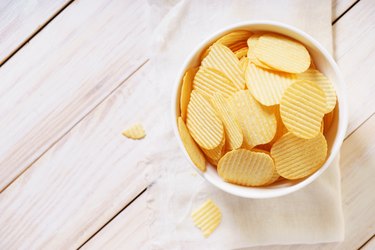
Chips are often rich in carbs, fat and sodium — and they don't contain many other nutrients. Salt and vinegar chips should consequently be consumed in limited amounts. Even heart-healthy chips aren't usually good for you, unless you're making your own at home.
Read more: The 10 Worst Foods You Can Buy
Video of the Day
Video of the Day
Salt and Vinegar Chips Nutrition
Salt and vinegar chips are very popular. Some companies, like Lay's, produce a variety of salt and vinegar chips. Lays makes Poppables, air-popped, Kettle Cooked, Stax and standard chips in this flavor.
According to Lay's, a serving of normal salt and vinegar chips is 28 grams (1 ounce), or about 17 chips. Each serving has 160 calories, 2 grams of protein and 10 grams of fat, and 1.5 grams of that come from saturated fat. Lay's salt and vinegar chips also have 15 grams of carbohydrates, and 1 gram of these carbohydrates comes from fiber.
There aren't too many essential nutrients in Lay's salt and vinegar chips. However, you can find 10 percent of your daily value for vitamin C and 9 percent of your daily value for potassium in each serving.
As their name implies, salt and vinegar chips also have a large amount of sodium. There are 220 milligrams of sodium in each serving of Lay's salt and vinegar chips. Other than that, you'll likely only find trace amounts (between 1 and 4 percent) of other nutrients, like iron.
Most salt and vinegar chips will have similar nutrition to that of Lay's chips, even when they've been baked or are made with reduced sodium. However, you may end up with substantially different nutrition if you make your own chips at home. Air-frying vegetables like plantain, cassava, beetroot and sweet potato can help you make your own heart-healthy chips.
Read more: 9 Better-for-You Potato Chip Swaps
Eating Chips and Your Health
Salt and vinegar chips are rich in calories, carbs and fat, but they're so processed that they don't provide you with many nutrients. It's easy to consume many servings of chips in one sitting.
Unfortunately, eating snacks like salt and vinegar chips means that you're essentially just consuming lots of empty calories. Eating chips regularly can consequently contribute to weight gain. The saturated fat found in chips can also increase your cholesterol levels.
Your sodium intake is also likely to be high if you eat foods like salt and vinegar chips on a regular basis. The American Heart Association says that most Americans consume too much salt on a daily basis. This sodium intake primarily comes from packaged, prepared and processed foods like salt and vinegar chips.
Too much sodium can increase your blood pressure. Elevated blood pressure can put you at risk for a variety of diseases, including cardiovascular diseases, kidney issues, osteoporosis and stomach cancer. Excess sodium can also cause you to retain water, which causes bloating and even weight gain.
Chips vs. Healthy Snacks
Chips are not very nutritious, and they're considered processed food. Harvard Health Publishing recommends choosing healthier snacks instead of processed foods like chips. Healthy snacks are not only more nutritious — they're more filling than processed snacks.
The American Heart Association considers healthy snacks to be unprocessed foods, like fruits, vegetables, nuts, seeds and whole grains. Examples of healthy snacks include low-fat cheese, hummus with vegetable sticks and roasted cashews.
Healthy snacks should also be low in added sugar. The Food and Drug Administration says that most Americans consume too many added sugars on a daily basis. You can swap snacks like candies, cookies and muffins for natural sugars, like fruit smoothies, yogurt with granola and oatmeal with berries.
- American Heart Association: "Healthy Snacking"
- Lay's: "LAY'S® Salt & Vinegar Flavored Potato Chips"
- Harvard Health Publishing: "Revamp Your Snacking Habits"
- Food and Drug Administration: "Sugars"
- American Heart Association: "How Much Sodium Should I Eat per Day?"
- American Heart Association: "Effects of Excess Sodium Infographic"
- American Heart Association: "Saturated Fat"